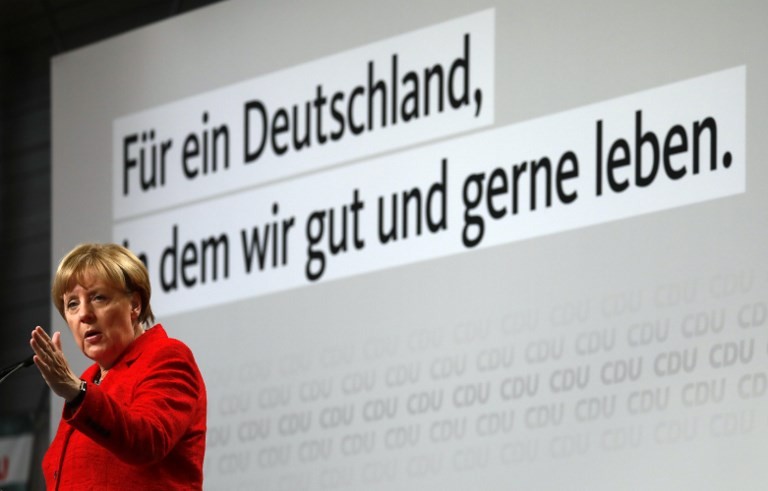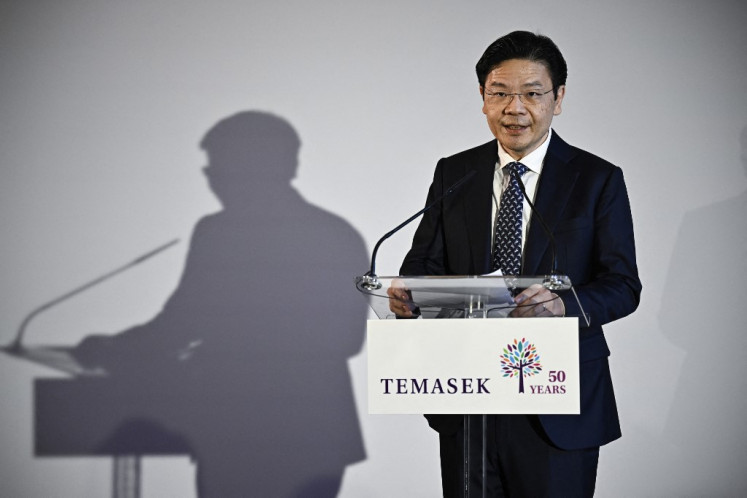Merkel seeks to break Germany's political deadlock
Change Size
 German Chancellor and Christian Democratic Union's (CDU) main candidate Angela Merkel delivers a speech during an election rally in Schwerin, northern Germany, on Sept. 19, 2017. Germany goes to the polls for parliamentary elections on Sept. 24, 2017. (Agence France-Presse/Odd Andersen)
German Chancellor and Christian Democratic Union's (CDU) main candidate Angela Merkel delivers a speech during an election rally in Schwerin, northern Germany, on Sept. 19, 2017. Germany goes to the polls for parliamentary elections on Sept. 24, 2017. (Agence France-Presse/Odd Andersen)
C
hancellor Angela Merkel opens talks Sunday with Germany's second biggest party on renewing their alliance, in a new attempt at shaking Europe's biggest economy out of paralysis after September's inconclusive elections.
The week of meetings between Merkel's conservative alliance and the Social Democrats (SPD) will examine whether both sides have enough common ground to begin formal coalition negotiations towards a new government by March or April.
After initial discussions on Wednesday, the parties issued a joint statement saying "trust has grown, we are optimistic about the start of negotiations".
But the talks are not without pitfalls -- including tricky questions surrounding the more than a million asylum seekers who have arrived in Germany since 2015.
The far-right anti-immigration AfD had capitalized on growing misgivings in Germany over the new arrivals, winning more than 90 parliamentary seats in the watershed election.
Read also: Merkel’s attempt to form a new German government collapses
Merkel was left without a majority, while the center-left SPD found itself with its worst post-war score.
Anxious to stem the haemorrhage to the far right, the conservative wing of Merkel's party as well as her Bavarian allies CSU are championing a tougher stance on immigration -- including demands that are unpalatable for the SPD.
But with an eye on a regional election in Bavaria later this year, where current polls show that the CSU could lose its absolute majority, party chief Horst Seehofer said it was clear that "things can't go on as before".
The CSU wants financial handouts to asylum seekers reduced and medical tests to determine if migrants are lying about their age in the hope of winning refugee status.
But SPD chief Martin Schulz signaled that the conservatives would have to compromise not only on immigration issues, but also on the centre-left's social welfare demands such as higher taxes for top earners.
"We will see if Madame Merkel and Mr Seehofer want to form a stable government with the SPD or not," he told Bild daily.
The SPD had initially vowed to go into opposition, but the collapse of coalition talks between Merkel and smaller parties pushed the Social Democrats to reconsider.
Schulz told Bild the talks "will be difficult. We will stay firm".
As both sides square up for a battle at the negotiating table, the parties have agreed on a gag on media interviews, with publicity limited to joint statements.
The decision is aimed at preventing a rerun of Merkel's previous failed attempt at forging a coalition late last year, when interviews given by negotiators soured the atmosphere.









